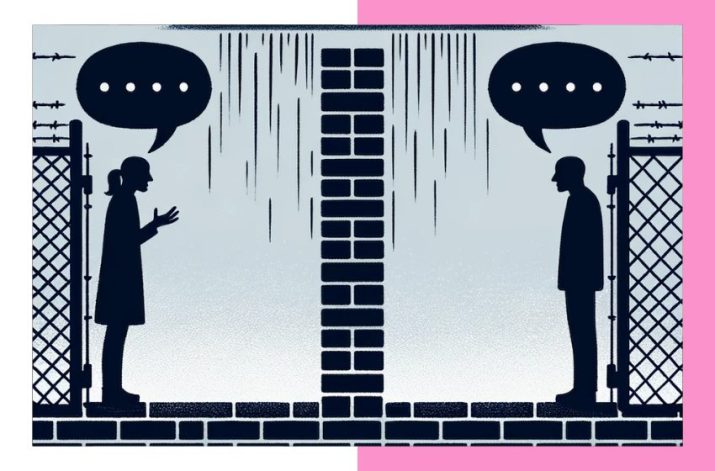How to Respond to Stonewalling
By Wilbert S
January 10, 2024 • Fact checked by Dumb Little Man

Stonewalling is a communication barrier that can present significant challenges in maintaining a healthy relationship. While many may dismiss it as simple silent treatment, this behavior has a far-reaching impact. It can escalate to levels of emotional abuse, causing a rift between partners and affecting the overall dynamics of a relationship. The act of stonewalling not only shuts down conversations but can also lead to long-term resentment and emotional distress.
This article aims to shed light on how to respond to stonewalling effectively. We will explore the intricacies of stonewalling behavior, identify its emotional effects, and present solutions for addressing this issue.
Whether you are looking to improve communication in your romantic relationship or any other type of partnership, this article will provide valuable insights and practical tips. Armed with this knowledge, you can work towards fostering healthy relationships and open dialogue.
What is Stonewalling?

Stonewalling is often described as a defense mechanism employed to avoid conflict and uncomfortable situations. When a person resorts to stonewalling, they create an emotional barrier that makes healthy communication nearly impossible. A stonewalling partner will typically avoid discussing important issues, refuse to answer questions, or provide minimalistic and vague replies. This avoidance serves as a way to escape accountability or dodge difficult emotions.
Understanding stonewalling is essential for anyone seeking a healthy relationship. It’s more than just the silent treatment; it’s an active effort to disengage from a conversation that may be necessary for the relationship’s wellbeing. While some may engage in intentional stonewalling as a form of manipulation, others may do it subconsciously as a coping mechanism. Regardless of the intent, the outcome is often damaging, causing emotional turmoil and stagnation in the relationship.
Why Do People Stonewall?

Stonewalling can arise for a multitude of reasons, ranging from intentional stonewalling to subconscious behavior triggered by emotional distress. Some may use stonewalling as a manipulation tactic, intentionally creating a communication blockade to gain the upper hand in a situation. Others may unintentionally stonewall due to overwhelming stress, anxiety, or emotional vulnerabilities. In such cases, stonewalling serves as a coping mechanism, albeit an unhealthy one, that helps the individual avoid immediate emotional discomfort or confrontation.
It’s crucial to distinguish the behavior from the individual. The act of stonewalling is a partners behavior and should be separated from not the person themselves. Acknowledging this distinction is essential for constructive dialogue and problem-solving. By recognizing that the behavior is an issue—rather than labeling the person as problematic—you create room for healthy communication and potential growth within the relationship.
>> Also Read: Am I Ready for Love? Key Questions to Ask Yourself Before Starting a Relationship
The Negative Effects

Stonewalling has significant negative effects on both individuals and the relationship as a whole. The most immediate impact is on the partners emotions, which can range from feelings of isolation to emotional distress. Over time, these effects can compound, leading to a difficult relationship marked by resentment, mistrust, and emotional detachment. The tension created through stonewalling can even escalate into a form of emotional abuse, severely compromising the well-being of the partner on the receiving end of such behavior.
In addition to the immediate emotional toll, stonewalling also fosters a toxic cycle within the relationship. When one partner engages in stonewalling, it often makes the other partner feel unable to express themselves, shutting down any form of healthy communication. This perpetuates a cycle of emotional withdrawal and stagnation, limiting opportunities for resolving conflicts or fostering emotional intimacy. Ultimately, if left unaddressed, this cycle can irreparably damage the relationship, making it increasingly difficult to maintain a loving and supportive partnership.
How to Respond to Stonewalling

Assess Your Own Behavior
Before confronting your partner, it’s important to evaluate your own body language and emotional state. It’s not uncommon to feel angry or feel defensive, which are natural responses. However, being aware of your own behavior and emotions can better prepare you for a constructive conversation.
Open Lines of Healthy Communication
The cornerstone of resolving any issue is healthy communication. Establish eye contact with your partner to foster a sense of connection. Ask direct questions and actively listen to the answers. Most importantly, create a safe space for open dialogue, allowing both parties to share their concerns and perspectives.
Self-Care Strategies
Your own well-being should never be overlooked, especially when dealing with difficult relationship dynamics. If talking fails to yield any positive outcomes, shift your focus to self-care. Whether it’s taking a break, indulging in hobbies, or even taking a walk, these activities can serve as a form of emotional reset.
Couples Counseling
Should the stonewalling continue and become a chronic issue, couples counseling may be a viable option. A licensed professional counselor can act as a neutral mediator, helping both parties navigate difficult conversations and providing strategies to improve the relationship.
Set Boundaries and Seek Individual Therapy
To protect your emotional health, it’s essential to set boundaries. Clearly define what behaviors you can and cannot tolerate. For deeper self-exploration and coping strategies, individual therapy or individual counseling can offer additional support and insights.
Common Misconceptions

It’s Just a Manipulation Tactic
Many people believe that stonewalling is purely a manipulation tactic, designed to control the other partner. While stonewalling can be used in this way, it’s crucial to recognize that it can also act as a coping mechanism. For some individuals, stonewalling is a way to handle overwhelming emotions or situations, although it is not a healthy way to do so.
It Only Happens in Romantic Relationships
The misconception that stonewalling is exclusive to romantic relationships is quite prevalent. In reality, stonewalling can occur in various types of relationships, including friendships, family dynamics, and workplace settings. The behavior is not confined to romantic partners but can affect anyone who engages in consistent communication with the stonewalling individual.
It’s Always Intentional
Another common misconception is that stonewalling is always an intentional act. The reality is that some people unintentionally stonewall when overwhelmed by emotions or stressors. In these instances, the stonewalling individual may not even be aware that their behavior is causing harm, making it all the more important to address the issue openly.
How to Foster Healthy Relationships
Take Accountability
In any relationship, taking accountability is paramount for fostering a healthy relationship. Owning up to your mistakes and making amends fosters trust and opens the door for constructive communication. It’s not just about acknowledging the faults of the other partner; it’s also about recognizing your own shortcomings and working to improve them.
Problem Solving
Open communication and effective problem solving can save a relationship from lingering issues that are left unaddressed. Instead of allowing conflicts to fester, take a proactive stance to resolve them. Problem-solving should be a collaborative effort between partners, involving open dialogue, compromise, and mutual respect.
Focus on Good Qualities
When conflicts arise, it’s easy to lose sight of the positive aspects of your relationship and your partner’s good qualities. Maintaining a balanced perspective about your life together can help navigate through challenging times. Focusing on the positive can serve as a grounding mechanism, reminding you why you value the relationship in the first place.
Conclusion
Stonewalling in a relationship can be a complex issue to handle. From communication to individual therapy, various strategies can help you respond to stonewalling in a healthy way. Couples therapy can also be a viable option for persistent issues. Most importantly, ensure that the focus is on fostering healthy relationships rather than perpetuating a cycle of emotional distress. If needed, seek professional help to ensure both partners’ emotional well-being is addressed.
Remember, the moment you realize there is stonewalling happening, it’s crucial to address it. Left unaddressed, it could lead to a breakdown in relationships. Take proactive steps, and don’t hesitate to seek professional help when needed.
>> Also Read: 27 Quotes About Setting Boundaries in a Healthy Relationship
FAQs: How to Respond to Stonewalling
What is stonewalling and why is it harmful?
Stonewalling is a defense mechanism used to avoid conflict and healthy communication. It can have significant negative effects, including emotional distress and perpetuating a cycle of emotional withdrawal in a relationship.
How can I respond to stonewalling in a healthy way?
The first step is to assess your own body language and emotions. Then, open lines of healthy communication by making eye contact and asking direct questions. If the issue persists, consider couples counseling with a licensed professional counselor.
Can stonewalling occur outside of romantic relationships?
Yes, contrary to the misconception that it’s limited to romantic relationships, stonewalling can occur in friendships, familial interactions, and even workplace settings.
Wilbert S
Wilbert is an avid researcher and is deeply passionate about finance and health. When he's not working, he writes research and review articles by doing a thorough analysis on the products based on personal experience, user reviews and feedbacks from forums, quora, reddit, trustpilot amongst others.




